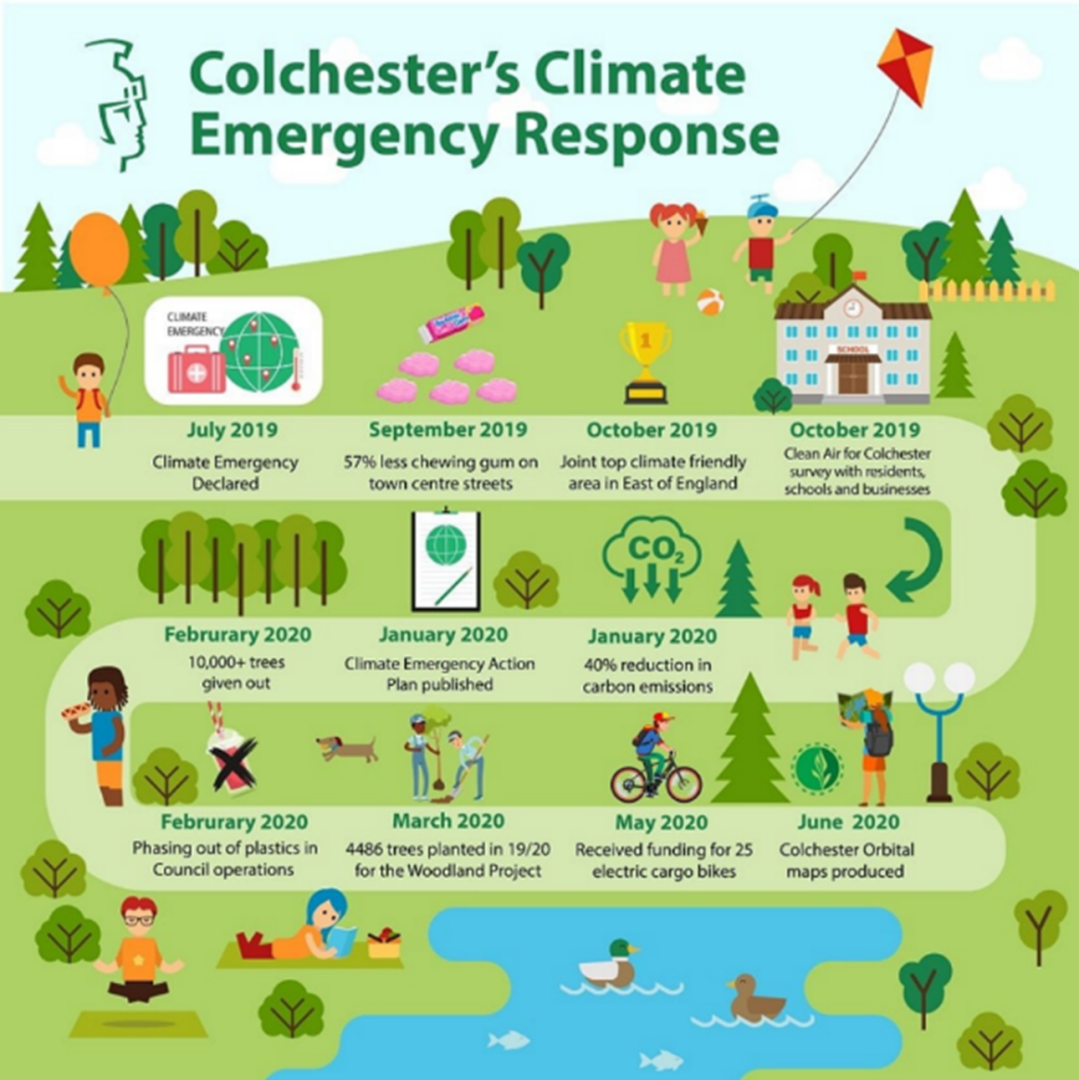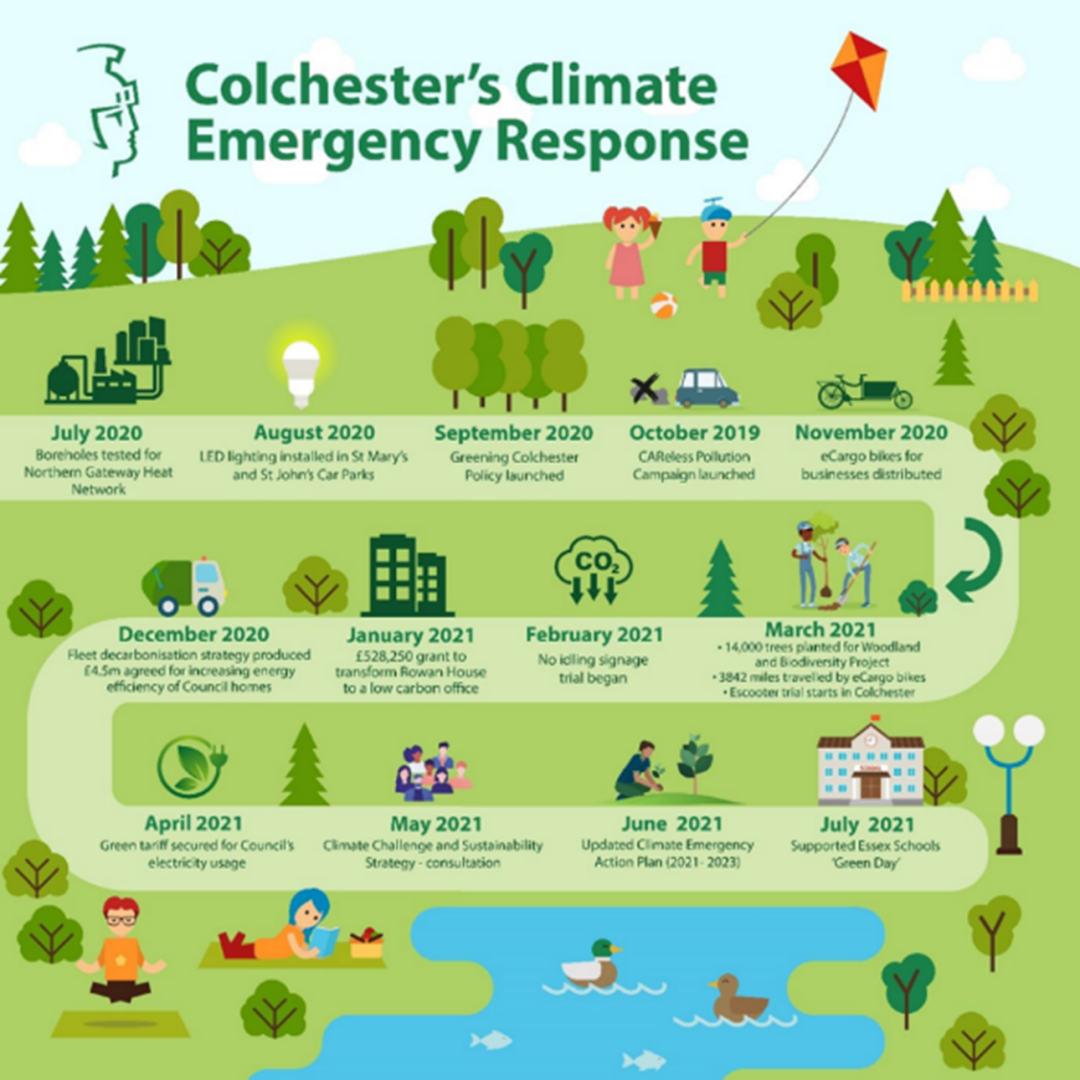Active Travel SPD
1. Introduction
Climate change is a global issue affecting everyone. Co-ordinated action from all sectors, national and local governments, and individuals is needed to mitigate and adapt to climate change. The science tells us that to avoid catastrophic effects we need to limit the increase in global temperature to 1.5oC. Mitigation measures are required to significantly reduce greenhouse gas emissions and limit global temperature rise. However, even with efforts to limit the cause of global warming, further climatic changes are inevitable in the future and the UK will need to adapt to the growing risks from climate change.


Colchester City Council declared a climate emergency in 2019 and since then have carried out numerous pieces of work across the organisation and city to respond to the climate emergency. The infographics, below, highlight the key areas of work in 2019/20, 2020/21 and 2021/22.

The Council is drafting 3 Supplementary Planning Documents (SPDs) to communicate Colchester City Council's ambitions in respect of the climate emergency for all development within the city. SPDs are material considerations in planning decisions. They build on adopted planning policy and provide guidance on how policy requirements should be implemented. The 3 climate emergency SPDs build on the adopted Local Plan and explain how development proposals should respond to the climate and ecological emergency. The SPDs are: Active Travel, Biodiversity, and Climate Change. All development proposals should strive to achieve ambitious carbon reductions, biodiversity enhancement and promotion of active travel to contribute towards Colchester becoming a greener city that is resilient to the climate and ecological emergency.
We are in a climate and ecological emergency – the time to act is now.
The 3 climate emergency SPDs will bring multiple benefits including benefits to health and wellbeing. A healthy environment plays a role in improving health and wellbeing. Many of the actions proposed in the 3 SPD's will also achieve health benefits for our communities. An increase in active travel will lead to more walking and cycling. More energy efficient homes will be good for people's wellbeing and reduce heating costs. An increase in biodiversity and green infrastructure is good for people's mental wellbeing.
This is the Active Travel SPD. It aims to clearly set out the principles the Council expects to ensure that development proposals respond to the climate emergency by contributing towards a high quality cohesive network of active travel routes and support sustainable growth in line with the adopted Local Plan.
Although this SPD applies primarily to major planning applications, some of the guidance may also be relevant to many minor applications (as defined in the National Planning Policy Framework, NPPF). The Active Travel section of the Climate Emergency Checklist provides further information on what is relevant to your application.
The Council is consulting on this document in accordance with regulations and the Council's Statement of Community Involvement. All responses received will be considered in preparing the final adopted version of this SPD. This SPD will form a material consideration in the determination of all planning applications for development including applications for renewal of consents.
Chapter 2 of the SPD sets out the background, a definition of active travel and reasons why an active travel SPD has been drafted. Chapter 3 sets out the national context and provides links to relevant reports. Chapter 4 sets out the Colchester and Essex context. It includes relevant Local Plan policies and relevant local strategies and documents. Chapter 5 provides details of the active travel infrastructure in Colchester. Chapter 6 sets out the elements that should be considered as part of new development proposals to encourage and support journeys by active modes. This chapter includes information on providing good quality infrastructure; improvements to existing infrastructure; provision of sufficient and good quality cycle and wheel parking; and information about other sustainable travel measures, promotion and community projects that will all help to encourage active travel. Chapter 7 sets out planning application expectations in relation to active travel modes.
There is a wealth of information, guidance and best practice available. This SPD does not attempt to distil all this information and guidance into one document. Links are provided throughout the SPD to more detailed guidance for those who want to find out more.
